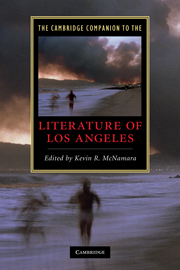Book contents
- Frontmatter
- Introduction: landmarks
- 1 The literature of the Californios
- 2 The Anglo invention of Los Angeles
- 3 LA fiction through mid-century
- 4 British expatriates and German exiles in 1930s-1940s Los Angeles
- 5 Postwar Los Angeles: suburban Eden and the fall into history
- 6 Los Angeles and the African-American literary imagination
- 7 Pacific Rim city: Asian-American and Latino literature
- 8 The literature of urban rebellion
- 9 City of sleuths
- 10 Los Angeles’ science fiction futures
- 11 Hollywood fictions
- 12 The Southland on screen
- 13 Scenes and movements in Southern California poetry
- 14 Surf, sagebrush, and cement rivers: Reimagining nature in Los Angeles
- 15 Essaying Los Angeles
- Guide to further reading
- Index
6 - Los Angeles and the African-American literary imagination
Published online by Cambridge University Press: 28 May 2010
- Frontmatter
- Introduction: landmarks
- 1 The literature of the Californios
- 2 The Anglo invention of Los Angeles
- 3 LA fiction through mid-century
- 4 British expatriates and German exiles in 1930s-1940s Los Angeles
- 5 Postwar Los Angeles: suburban Eden and the fall into history
- 6 Los Angeles and the African-American literary imagination
- 7 Pacific Rim city: Asian-American and Latino literature
- 8 The literature of urban rebellion
- 9 City of sleuths
- 10 Los Angeles’ science fiction futures
- 11 Hollywood fictions
- 12 The Southland on screen
- 13 Scenes and movements in Southern California poetry
- 14 Surf, sagebrush, and cement rivers: Reimagining nature in Los Angeles
- 15 Essaying Los Angeles
- Guide to further reading
- Index
Summary
“The function of the imagination is not to make strange things settled, so much as to make settled things strange.” G. K. Chesterton, The Defendant (1901) / No generalization about the African-American writers of Los Angeles can do justice to the rich variety of their perspectives upon their city, but they do tend to focus on two interrelated themes: its utopian promise of beauty, ease, riches, even fame, and the possibility of racial violence whose eruption is as unpredictable as the region's earthquakes. Los Angeles is “full of surprises,” as Bebe Moore Campbell said. The racial past that ruptures without warning the delicate world of “settled things” is a recurrent theme. The African-American aphorism “quiet as it's kept,” used by detective fiction writer Paula Woods in Stormy Weather (2001), implies that a secret not kept is no longer quiet. The promise of safety is carried in images of community like Gary Phillips's “three B's” - “beauty shops, barber shops, and barbecues” - or it is claimed as the fundamental rights to liberty and justice in a city that for most of its history has given blacks little of either. The struggle to turn urban space into livable places produces a condition diagnosed by Wanda Coleman in the title of her 1996 collection of essays; the black Angeleno is a Native in a Strange Land. The most dramatic example of this condition may occur in Octavia Butler's science fiction novel Kindred (1979). Butler's protagonist, Dana, is repeatedly thrust from the present into the historical past of 1815-30 Maryland and back, so that the familiar becomes strange, the strange familiar.
- Type
- Chapter
- Information
- The Cambridge Companion to the Literature of Los Angeles , pp. 75 - 86Publisher: Cambridge University PressPrint publication year: 2010



